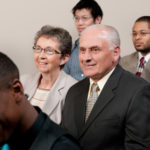NASHVILLE, Tenn. (BP)—Protestant churches may be a little more diverse these days—and that’s a good thing, their pastors say.
 Eighty-one percent of Protestant pastors say their congregation is predominantly made up of one racial or ethnic group. That’s down from 86 percent four years ago, according to a new study from LifeWay Research.
Eighty-one percent of Protestant pastors say their congregation is predominantly made up of one racial or ethnic group. That’s down from 86 percent four years ago, according to a new study from LifeWay Research.
It’s a small but significant step, said Scott McConnell, executive director of LifeWay Research, in a nation where Sunday mornings often remain segregated.
“Protestant churches are still mostly divided by race,” said McConnell. “But they’re heading in the right direction.”
Pastors want to see diversity
Lifeway Research surveyed 1,000 Protestant pastors last fall about racial diversity in their congregations—and then compared the results to a similar survey in 2013.
 In the most recent survey, 93 percent of pastors—including 80 percent who strongly agree—say every church should strive to achieve racial diversity. Four percent disagree. Three percent are not sure.
In the most recent survey, 93 percent of pastors—including 80 percent who strongly agree—say every church should strive to achieve racial diversity. Four percent disagree. Three percent are not sure.
Four years earlier, 85 percent of pastors agreed churches should strive for diversity. That included 66 percent who strongly agreed, while 12 percent disagreed and 3 percent weren’t sure.
Pastors in the South (96 percent) are more likely than pastors in other regions to say churches should strive for diversity. White pastors (94 percent) are more likely to agree than pastors from other ethnic backgrounds (86 percent), while 88 percent of African- American pastors agree churches should strive for diversity. Lutheran pastors are least likely (82 percent) to agree compared to pastors in other denominations.
When it comes to congregation diversity, 81 percent of pastors in the latest survey say their church mostly consists of one racial group. Sixteen percent disagree. Three percent are not sure.
Sign up for our weekly edition and get all our headlines in your inbox on Thursdays
Pastors of larger churches—those with 250 or more attenders—were least likely (74 percent) to say their church is made up mostly of one ethnicity. That jumps to 81 percent for churches with 249 or fewer attenders.
Based on denominational affiliation, Lutheran pastors (89 percent) are most likely to say their church is made up of predominantly one ethnic group. Baptist (81 percent), Presbyterian/Reformed (77 percent) and Pentecostal pastors (68 percent) are less likely.
Laity less devoted to diversity
A 2014 LifeWay Research study found two-thirds of American churchgoers found two-thirds of American churchgoers felt their church had done enough to become diverse. And fewer than half (40 percent) said their church needed to become more diverse.
More than half of churchgoers disagreed when asked if their church needed to become more ethnically diverse. That included a third who strongly disagreed.
Evangelical churchgoers (71 percent) were most likely to say their church is diverse enough. White churchgoers (37 percent) were least likely to say their church should become more diverse. African-Americans (51 percent) and Hispanic-Americans (47 percent) were more likely to say their church needs to be more diverse.
The question of diversity will likely become more pressing for churches in the future, said McConnell. About half of the children under 10 in the United States are ethnic minorities, according to the U.S. Census Bureau.
“Pastors want their congregations to be more diverse—because their communities are more diverse,” said McConnell. “But people in the pews aren’t there yet. There are hard cultural divides to overcome.”
The phone survey of 1,000 Protestant pastors was conducted Aug. 30 to Sept. 18, 2017. The calling list was a stratified random sample, drawn from a list of all Protestant churches. Researchers used quotas for church size.
Each interview was conducted with the senior pastor, minister or priest of the church called. Analysts weighted responses by region to reflect the population more accurately.
The completed sample is 1,000 surveys, providing 95 percent confidence the sampling error does not exceed plus or minus 3.2 percent. Margins of error are higher in sub-groups.
Comparisons are also made to a telephone survey of 1,007 pastors using the same methodology Sept. 4-19, 2013 and 1000 pastors Sept. 11-18, 2014.













We seek to connect God’s story and God’s people around the world. To learn more about God’s story, click here.
Send comments and feedback to Eric Black, our editor. For comments to be published, please specify “letter to the editor.” Maximum length for publication is 300 words.